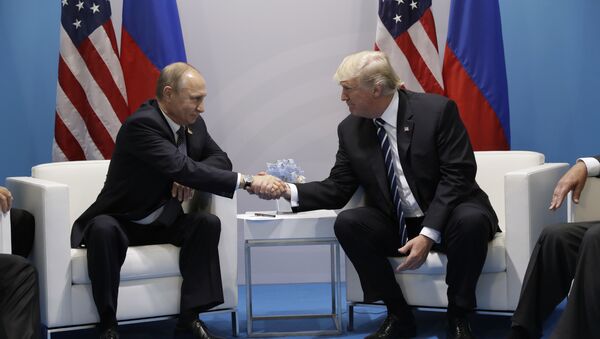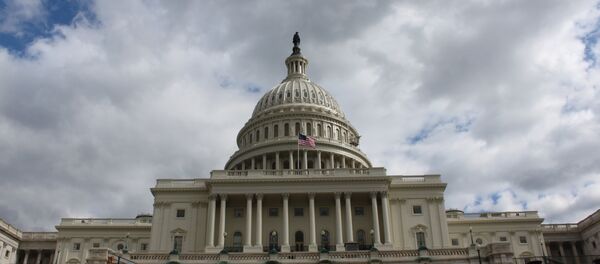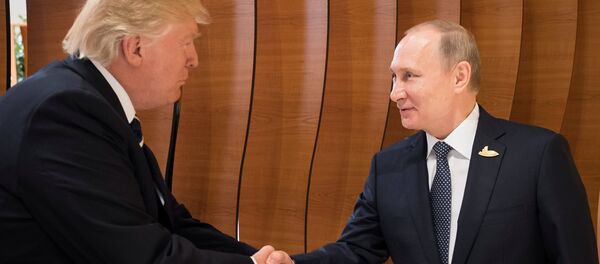WASHINGTON (Sputnik) — US Senators last month overwhelmingly passed a sanctions package designed to penalize Russia for allegedly interfering in the 2016 US election. The bill is on hold in the House, however, due to a procedural issue, because according to the US constitution the legislation was not supposed to originate in the Senate in the first place.
Donald Trump Jr. earlier on Tuesday, poured fuel on the fire on the election meddling scandal, by releasing an email chain with British publicist Rob Goldstone about a meeting with a Russian lawyer to allegedly discuss compromising information on Democratic presidential nominee Hillary Clinton.
US House Intelligence Committee Ranking Member Adam Schiff said the meeting exposes a "potential form of collusion," while Clinton’s former running mate, Senator Tim Kaine, claimed the Trump-Russia probe has moved beyond obstruction of justice and into a new phase that potentially includes treason.
Trump and Russian President Vladimir Putin discussed the sanctions bill last week during their first meeting on the sidelines of the G20 in Hamburg. The two leaders also agreed to a ceasefire in Syria and had constructive talks on the Ukraine crisis and cybersecurity, Secretary of State Rex Tillerson said after Friday’s meeting.
GROUNDLESS SANCTIONS
Tillerson also said Trump and Putin focused on ways to move forward from the issue of Russia's alleged meddling in the November 8 election.
Eurasian Business Coalition Vice President Ralph Winnie told Sputnik it was troubling that US lawmakers were blaming Russia despite the lack of evidence.
"It is hard to know what is true with all the fake news now circulating. It is very problematic for the United States to single out Russia," Winnie said. "Whether they did anything or not that impacted the election remains to be seen."
Winnie remarked that years before the 2016 elections, US political leaders and security specialists had expressed far more concern about alleged cyberespionage activities against US targets by China rather than Russia.
"Before the elections the Obama administration had a lot of issues about cyberespionage conducted by China. There was a lot of talk about to how to proceed on dealing with that at the time," he said.
Critics of Russia could also be accused of hypocrisy given the US government’s track record of meddling in the elections of other countries, Winnie pointed out.
US President Barack Obama while in office made no secret of his efforts – usually unsuccessful – to convince the electorates of other nations to vote the way he wanted them to, Winnie recalled.
"What about Obama in 2016 when he tried to influence the Brexit vote in the United Kingdom telling UK voters they should reject the proposal [to leave the EU]?" he asked.
"We have seen from what came out of the DNC emails that Bernie Sanders was not being treated fairly during the 2016 primary campaign against establishment favorite Hillary Clinton. What do you do in that situation?" he asked.
UNDERMINING US-RUSSIA DETENTE
A US congressman introduced a bill on Monday that would cut off funding for any efforts by Trump to cooperate with Putin on a joint cybersecurity unit in another sign that key players in Washington are apparently eager to stymie cooperation with Moscow.
California State University Professor Emeritus of Political Science Beau Grosscup told Sputnik that the Democratic National Committee and Hillary Clinton loyalists were making common cause with the main US national security and intelligence agencies who wanted competition and confrontation, not cooperation with Russia.
"This effort is consistent with the Trump Administration’s push to take a ‘new approach’ to Russia-US relations that is very much against the wishes of the Democratic Party and national security state who are looking to start a ‘New Cold War’ with now capitalist Russia," Grosscup warned.
Much would depend on what Special Prosecutor and former Federal Bureau of Investigation (FBI) Director Robert Mueller discovered, or failed to uncover in his current investigation, Grosscup predicted.
On Sunday, The New York Times reported that Trump's son had held an unreported meeting with Russian attorney Natalia Veselnitskaya. On Tuesday, Veselnitskaya told NBC News that she never had any ties to the Kremlin and did not request a meeting with Trump's son during the 2016 campaign.
Kremlin spokesman Dmitry Peskov said on Monday he did not know who Veselnitskaya was.
Russian officials have repeatedly denied allegations of interfering in the US elections, calling the charges absurd and groundless and an attempt to distract from pressing domestic issues.






